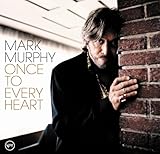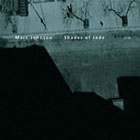Home » Jazz Articles » Multiple Reviews » Slightly After the Fact: Mark Murphy's Once to Every Hea...
Slightly After the Fact: Mark Murphy's Once to Every Heart / Marc Johnson's Shades of Jade
From a much more limited perspective—my own—these two discs are like Siamese twins, having inadvertently paired themselves in a stack of CDs that has followed me around for two years and, unfortunately, gone unreviewed as one more urgent event gave way to another. With these two Mar(k/c)s having spent so much time side-by-side on the MP3 player, it seems only natural to have them appear side-by-side in a review, particularly since their styles of execution make for an interesting juxtaposition.
 Mark Murphy
Mark Murphy
Once to Every Heart
Verve
2004
The band Cracker sang that the world needs another folk singer like we need a hole in the head; the same could be said of boy bands and jazz balladeers. Their sheer ubiquity means that the burden of proof falls upon them to justify their existences. For the latter (because almost nothing on this planet can justify boy bands), the perpetual challenge is to leave a unique mark on the tried-and-tested standards—to make this familiar material, performed by countless others, swing or swoon in new ways.
For Once to Every Heart, veteran bop vocalist Mark Murphy teamed up with young German trumpeter Til Broenner to tackle the ballads each had been lugging around in his sheet music for years. Broenner (co-arranger, performer and producer, but left off the cover) wanted things simple: no gargantuan band arrangements, no fancy effects. The album would be polite and straightforward, which isn't particularly novel; but by avoiding frills the two musicians would fully concentrate their individual talents on the music, thereby giving it greater depth and personality.
What came out of those sessions (after three years on the shelf until Verve picked them up) is an adore-it- or-hate-it recording because of Murphy's peculiar vocal approach to these subdued tunes. His bold and distinctive phrasing, full of hiccups, dips and flourishes, odd timing and deliberate aberrations, has rightfully earned him admirers over his prolific five-decade career, but on these slow-burning ballads it seems willfully and irritatingly idiosyncratic. He extends vowels and clips consonants for no discernible reason, and his pauses between lines often sound halting and unnatural, rather like Christopher Walken singing jazz favorites. Take his rendition of "When I Fall in Love," the first thirty seconds of which are Murphy, entirely alone, sprinting and slurring his way through the following lines:
"When I fa-a-all in luh-uh-uh-uhve...it will be-e-e-h...f-f-forever...or I'll n-n-n-n-yever fall e-e-in- n-n-n...l-uh-uh-uh-uhf-f-f-f."
These pauses indicated with ellipses should, in a poetic sense, represent something. Second guesses. Painful admissions. Distant memories crowding out the present. Yet they just sound as if they've been used to inject some flair and spice up a drab ballad. That's especially true of the downright peculiar emphasis on "never." A resolute "never" is fine. A reluctant "never" is too. But a "n-n-n-n-yever"? What exactly is that?
On "Skylark," Murphy suddenly and inexplicably erupts over a "BLOS-uhm cuhv-ered lay-ay- ay-ay-ane!" and his falsetto howl of "crazy as a l-o-o- o-o-o-ohn" genuinely sounds like the ranting of a madman. This makes an excellent contrast with the slow, poignant strings, which enter when the "You Don't Know What Love Is" medley begins, and the brief appearances of Broenner's thin, sparing trumpet. But is it a meaningful contrast? Probably no.
Murphy's spoken style works better on the pained regret of "I'm Through with Love," at least for most of the song, the little-known "Our Game," and best of all on "Bein' Green," which even Frank Sinatra couldn't nail satisfactorily. And yet even here he ruins an otherwise solid run by shooting for an unattainable falsetto note (..."or stars in the sky-ey-ey-ey"). This sort of arbitrariness wears thin very quickly.
The instrumental arrangements are where the disc is most consistently strong. On a track like "I'm Through with Love," Frank Chastenier's piano comping, Broenner's smoky brass, and Nan Schwartz's fluid strings are downright exquisite, capturing the essence of the song far better than Murphy's ostensibly heartfelt closing mumblings about walking down the street holding his own hand. At times like these ("My One and Only Love" suffers especially from this cloying-but- insincere vocal approach), Murphy comes across as a mix between Bill Murray's Nick the lounge singer from Saturday Night Live and Mike Myers' beat poet in So I Married an Axe Murderer; the band seems to be on a different plane altogether.
There have been a number of favorable reviews—here on AAJ and elsewhere—of this album over the past two years, but none could convince me of Once to Every Heart's lasting merit after I'd returned to the album time and again to listen with fresh ears. Murphy's offbeat delivery simply doesn't mesh with either the ballad songbooks or the material as performed by the band.
 Marc Johnson
Marc Johnson
Shades of Jade
ECM
2005
There is no such disparity among the bandmates on Marc Johnson's Shades of Jade. From the sultry and subdued opening bars of "Ton Sur Ton," the entire outfit is as synergistic and cohesive as one can get. What's most amazing is that there is none of the ostentatiousness of, for example, Murphy's vocal performance to be found here, even though these are all musicians straight off the jazz A-list: guitarist John Scofield, saxophonist Joe Lovano, pianist Eliane Elias, drummer Joey Baron, and Johnson himself. It's a group that has immense chops but sounds as humble and restrained as if it had nothing at all to prove. And these musicians are so firmly established that they really don't.
Shades of Jade is exactly what the title suggests: atmospheric, dreamy, wistful (like many ECM releases, but also warm and embracing in a way that many aren't). Lovano leads the first half of the tenderly evocative "Aparecu;" after a soft rumble from Baron, Elias takes over for a minute until the two reunite. It's gorgeously executed, with Lovano introducing supple little flourishes when they fit, brooding when in a more introspective mood. Elias lets her musings echo and dance and fade.
The lyrical ballads don't break until "Blue Nefertiti," a swinging blues full of feints and jabs that evolved out of saxophonist Wayne Shorter's melodic line in "Nefertiti" (what else?). Its only upbeat companion on this disc is "Raise," a cool soul showcase for Scofield, a honking and wailing Lovano, and organist Alain Mallet. Mallet returns later to provide the droning, ominous foundation for something altogether different, the haunting Armenian song "Don't Ask of Me (Intz Mi Khatrir)." Here Johnson bows some of the most grippingly elegiac lines in all of jazz. This track, along with the almost menacing "Since You Ask," is one of the few occasions during the disc's one-hour running time that Johnson assumes what spotlight there is to speak of. On the latter it's Baron, not Mallet, who provides the foundation, a silken tapestry of cymbals.
In his own review of this disc back in 2005, AAJ's John Kelman opened by saying, "Some would argue that it's impossible to call a recording classic until sufficient time has passed to determine its true staying power." But after more than two years with Shades of Jade, its initial appeal has not faded in the slightest and the ten tracks are as moving and compelling as they were first time around. Naturally, it would take many more years to award Shades of Jade definitive classic status, but time marches on and Kelman's original assessment still holds. Taking an even longer view, the odds are certainly in its favor.
Tracks and Personnel
Once to Every Heart
Tracks: I'm Through with Love; When I Fall in Love/My One and Only Love; Skylark/You Don't Know What Love Is; Our Game; I Know You from Somewhere; Bein' Green; Once to Every Heart; It Never Entered My Mind; Do Nothing Till You Hear from Me; Love Is Here to Stay.
Personnel: Mark Murphy: vocals, piano (9); Till Broenner: trumpet and flugelhorn, producer; Frank Chastenier: piano (1-8, 10); Christian von Kaphengst: acoustic bass (1, 3-5, 7, 9); Nan Schwartz: orchestra arranger and conductor; string orchestra (1, 3-5, 7, 9).
Shades of Jade
Tracks: Ton Sur Ton; Aparaceu; Shades of Jade; In 30 Hours; Blue Nefertiti; Snow; Since You Asked; Raise; All Yours; Don't Ask of Me.
Personnel: Joe Lovano: tenor saxophone; John Scofield: guitar; Eliane Elias: piano; Marc Johnson: double bass; Joey Baron: drums; Alain Mallet: organ.
< Previous
When The Day Is Done
Next >
Magic Tales
Comments
Tags
For the Love of Jazz
 All About Jazz has been a pillar of jazz since 1995, championing it as an art form and, more importantly, supporting the musicians who create it. Our enduring commitment has made "AAJ" one of the most culturally important websites of its kind, read by hundreds of thousands of fans, musicians and industry figures every month.
All About Jazz has been a pillar of jazz since 1995, championing it as an art form and, more importantly, supporting the musicians who create it. Our enduring commitment has made "AAJ" one of the most culturally important websites of its kind, read by hundreds of thousands of fans, musicians and industry figures every month.


















